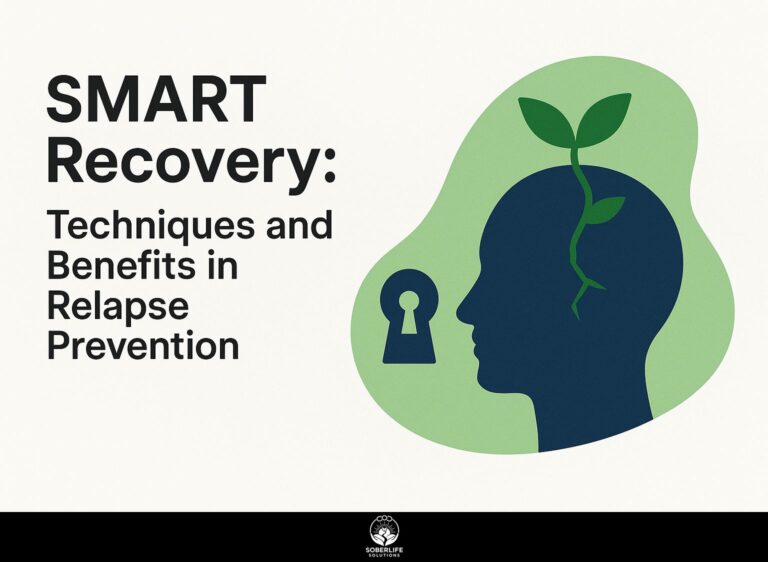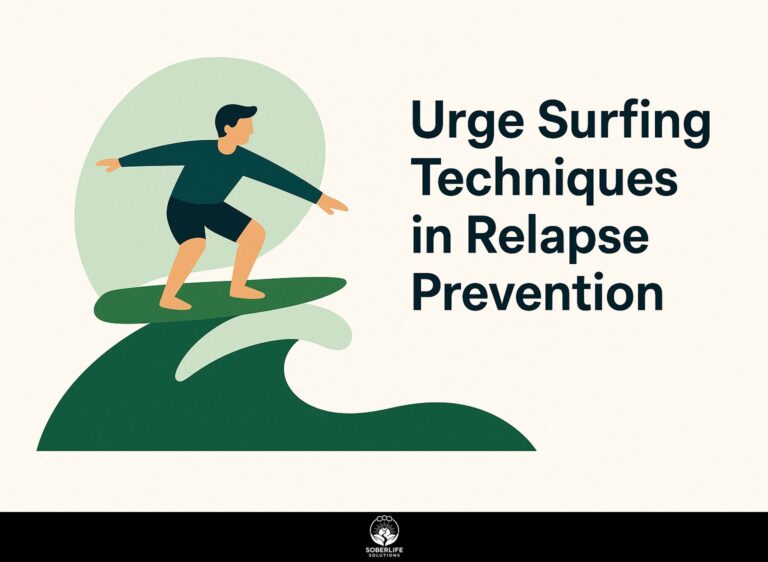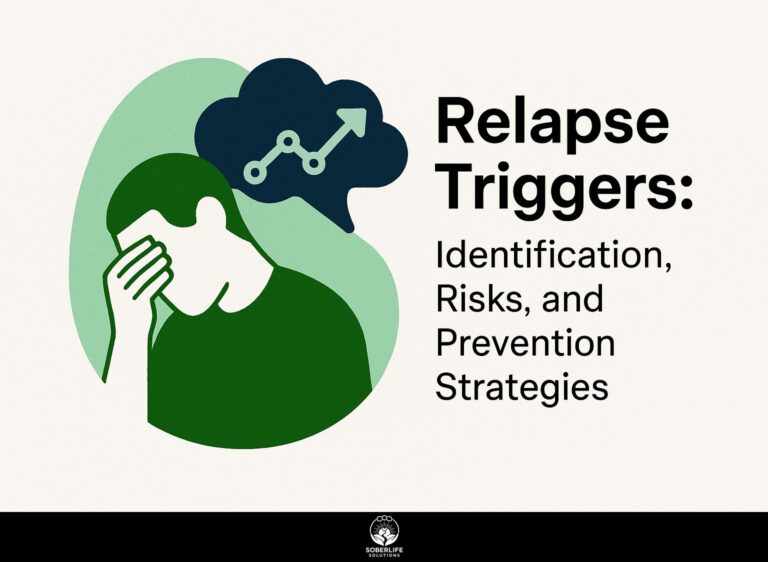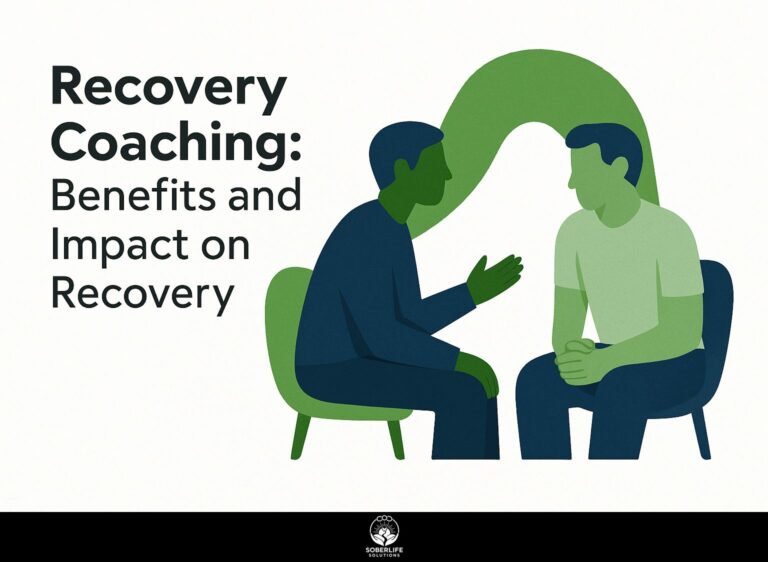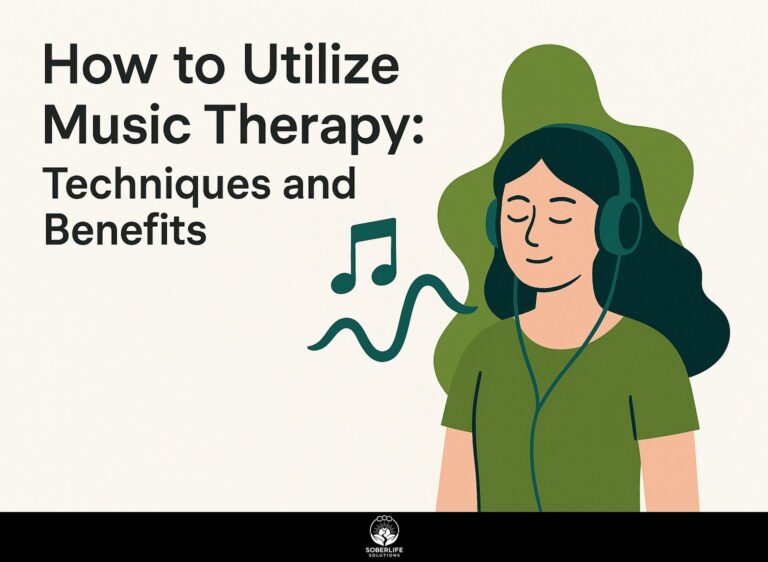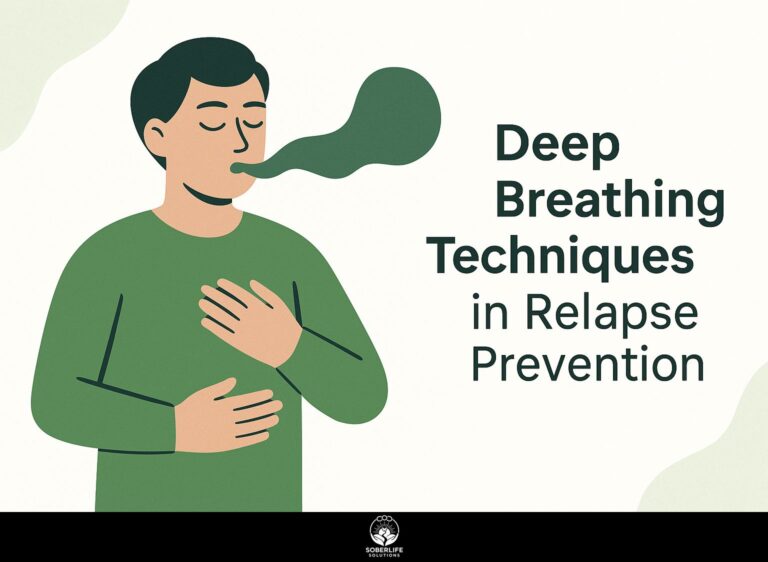How to Choose a Qualified Therapist? A Step-by-Step Guide
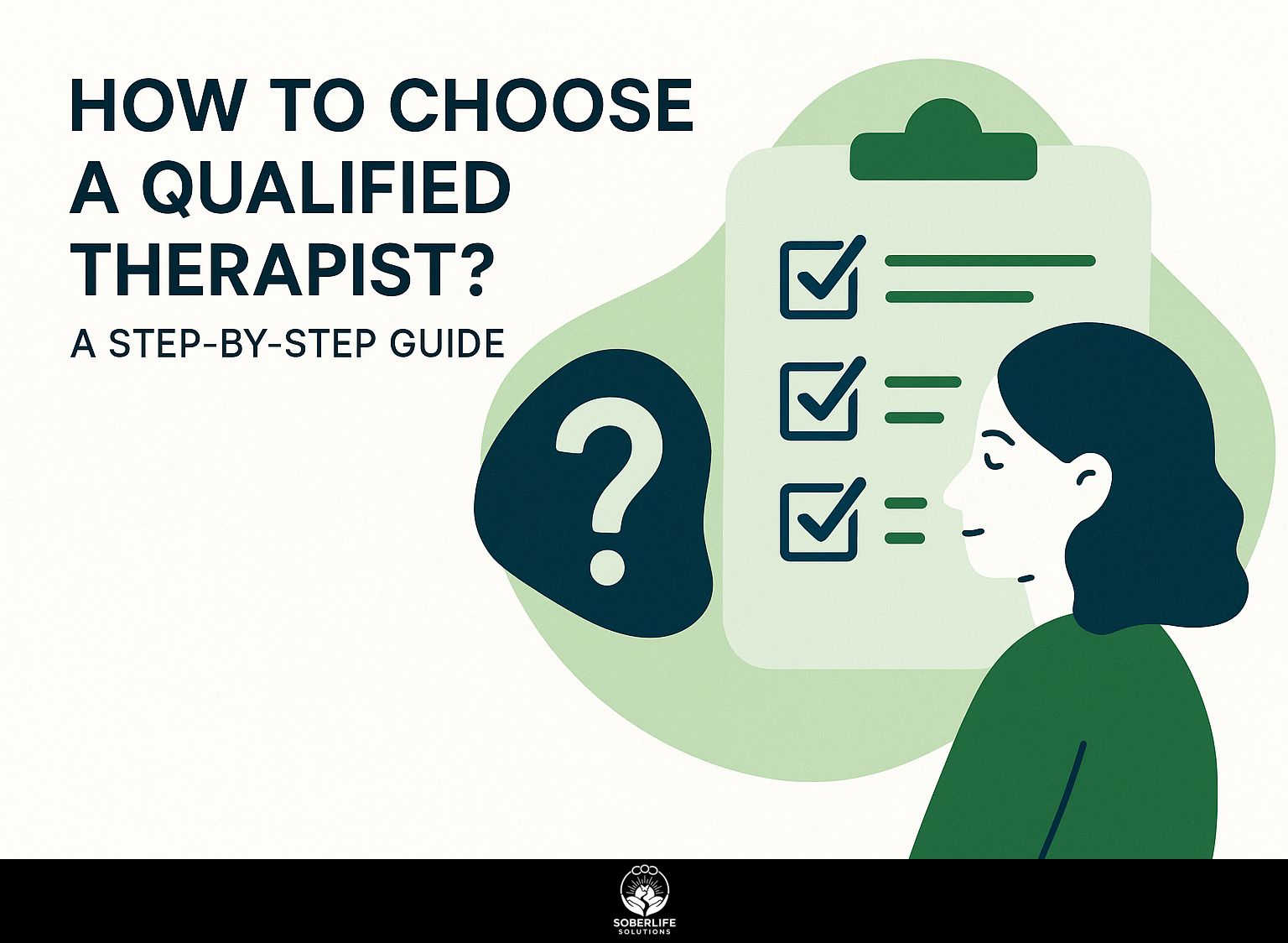
Choosing the right therapist can greatly improve your mental health. Whether you’re considering cognitive-behavior therapy (CBT), behavior therapy, or cognitive therapy, choosing a well-trained psychologist is essential. In this detailed guide, we’ll help you check your needs, learn about different therapists, and see if they match your goals for therapy. Let’s begin this experience together!
Key Takeaways:
Importance of Finding the Right Fit
Finding a suitable therapist can improve therapy success by up to 70%, directly affecting the connection between therapist and patient as well as the patient’s comfort.
To determine a good therapist fit, consider shared values such as empathy and approachability, as well as communication styles. For instance, some individuals may prefer a more direct approach, while others may thrive in a nurturing, collaborative environment.
Studies show that therapists who match what clients want can greatly improve how satisfied clients are with their treatment and the results they achieve. Notably, some leading researchers at Frontiers in Psychology have emphasized how matching client and therapist expectations can significantly enhance therapeutic outcomes. Find therapists who focus on issues like anxiety or trauma to build a stronger therapeutic connection.
Meeting for the first time can help assess these parts, ensuring the experience is useful.
Different Types of Therapists
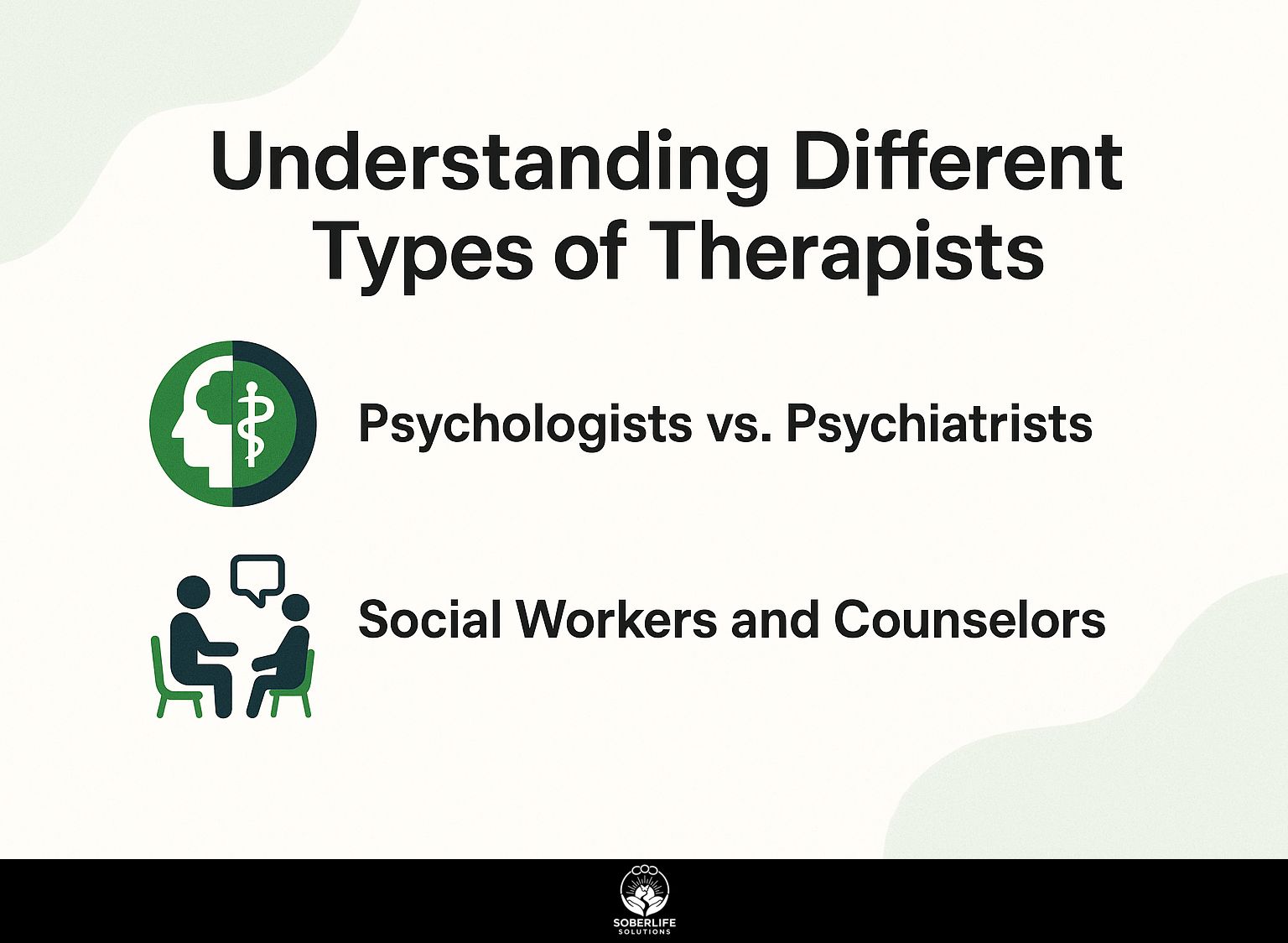
Different therapists provide a range of mental health services, including psychological assessments and managing medications, so it’s important to know what they do. According to Indeed, mental health professionals can also offer guidance on various therapeutic techniques and support for emotional well-being. See also: When to ask for professional help for those who may need additional support.
Psychologists vs. Psychiatrists
Psychologists focus on psychotherapy and cognitive-behavioral techniques, whereas psychiatrists can prescribe medication, offering a broader scope of treatment options.
Psychologists typically hold a doctoral degree in psychology and specialize in talk therapies. For instance, a psychologist may use cognitive-behavioral therapy to help patients cope with anxiety.
In contrast, psychiatrists have a medical degree, allowing them to diagnose mental health conditions and prescribe medications like antidepressants. If you are having serious symptoms, such as thinking about ending your life, it is wise to see a psychiatrist.
On the other hand, for ongoing support or therapy, a psychologist may be a better fit. This difference is important for properly meeting your mental health needs. For expanded context, a discussion on Reddit’s Indian Med School community delves into the nuances between choosing a psychiatrist or psychologist, offering insights into what might best suit your situation.
Social Workers and Counselors
Social workers and counselors often emphasize community resources and advocacy, providing emotional support and behavioral therapy within various settings.
While both professionals work to improve individual well-being, social workers focus more on systemic issues, advocating for broader social reforms and access to resources. Many people working in this area have a Master of Social Work (MSW) degree and specialize in areas like child welfare or mental health.
Most counselors hold a Master’s degree in counseling or psychology. They learn therapy techniques, such as cognitive-behavioral therapy, to support individuals dealing with personal problems. Even though their approaches vary, both roles are essential in providing full support to people and communities.
Assessing Your Needs
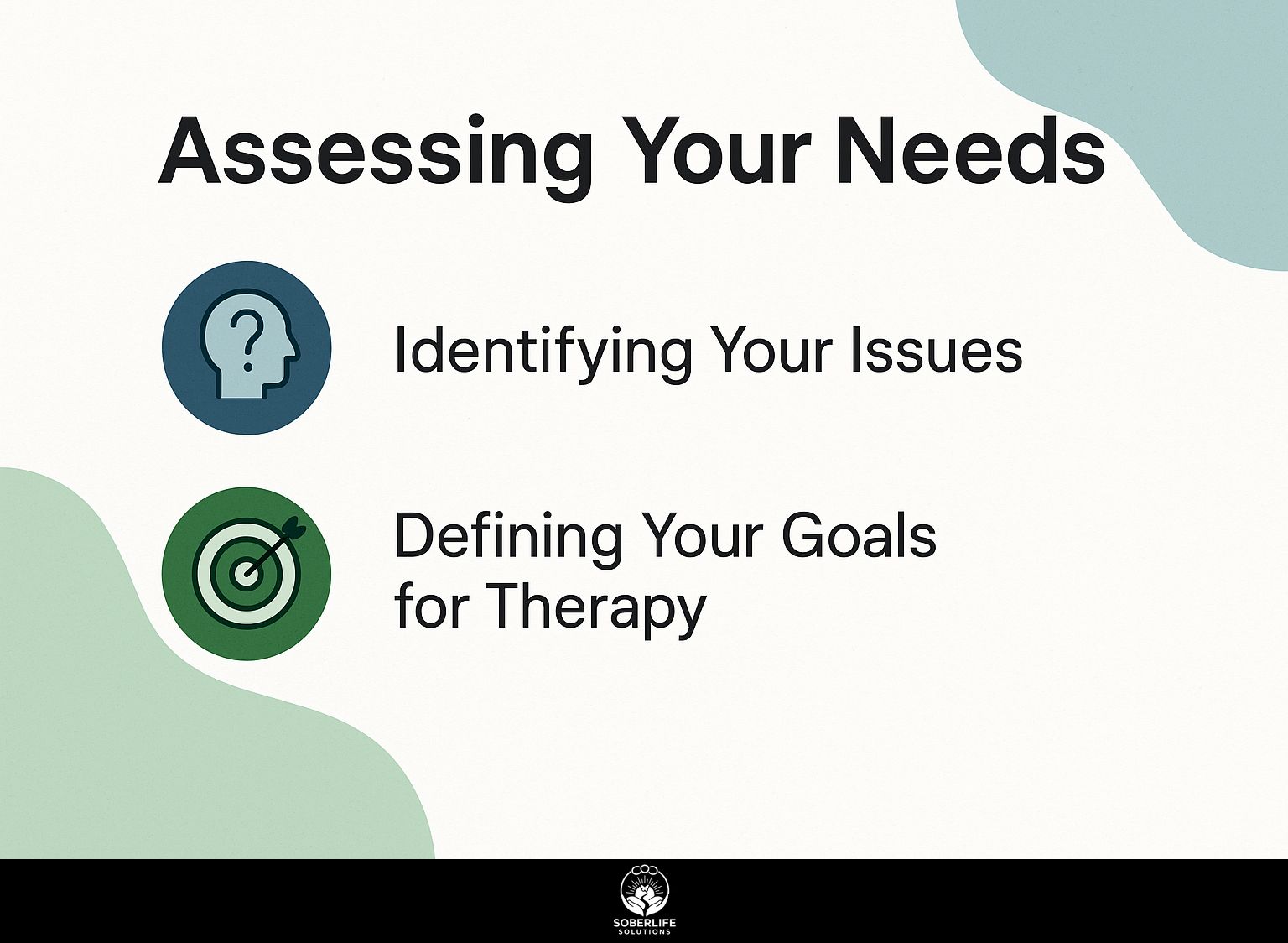
Knowing your mental health needs is the basis for choosing the right therapist and treatment plan. This approach aligns with the principles outlined in our analysis of when to ask for professional help, offering guidance on recognizing the right moment to seek assistance.
Identifying Your Issues
Start your therapy by figuring out any mental health issues you might have, like anxiety or depression, to help you choose the right therapist.
Start by reflecting on your feelings through journaling. Document your daily emotions and recognize any patterns.
Next, consider any past trauma that might be affecting your current mental state, and write down specific instances that stand out. Jot down symptoms you experience, such as changes in sleep or appetite.
To help with this self-check, use the free tests from Mental Health America to better understand your situation. This process gets you ready for therapy and helps you understand yourself better.
Defining Your Goals for Therapy
Having clear therapy goals, like working on coping methods or dealing with specific anxiety triggers, can greatly improve your therapy experience.
To articulate your objectives effectively, consider specific, measurable goals. For instance, instead of saying “I want to feel better,” aim for “I want to handle stress without feeling overwhelmed by the end of this month.”
Another common goal is improving communication skills, which might translate to “I will practice expressing my feelings in social settings once a week.”
Apps for journaling can help you monitor your progress, and talking about these goals with your therapist keeps your sessions on track and responsible.
Researching Potential Therapists
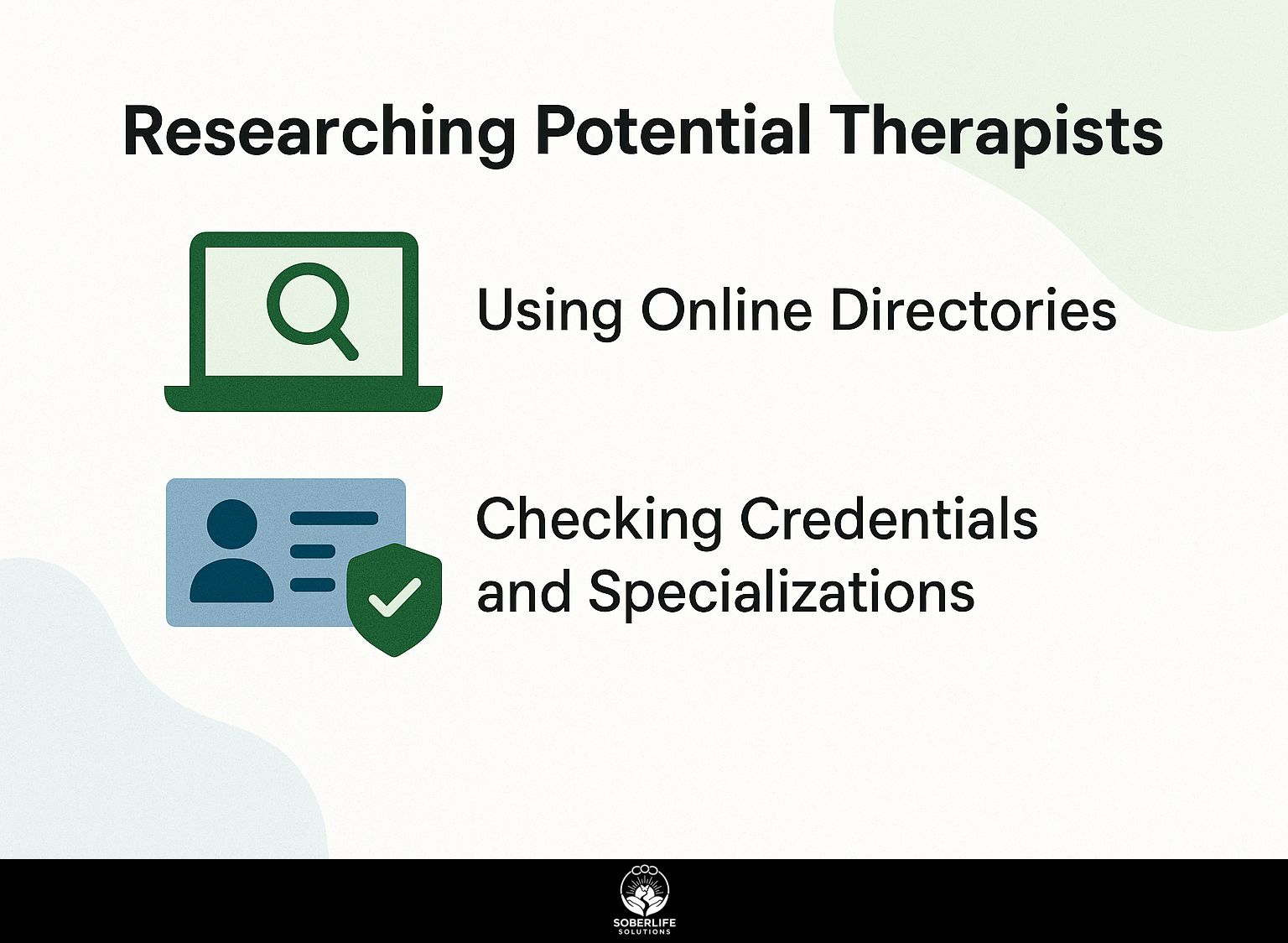
Using therapist directories can make it easier to find qualified mental health professionals who match your specific needs. For those seeking specialized guidance, such as alcohol treatment, discover key considerations that can aid in selecting the right approach.
Using Online Directories
Websites like Psychology Today and TherapyDen provide lists of therapists where you can find professionals by location, specialty, and the insurance they accept.
To maximize these platforms, first clearly define your therapy needs-whether it’s anxiety, couples therapy, or a specific demographic focus.
Make good use of the search options: for example, choose ‘Cognitive Behavioral Therapy’ on Psychology Today to find experts in that method.
Read therapist bios thoroughly; look for those who mention evidence-based practices and your preferred treatment settings.
Don’t hesitate to contact potential therapists for a preliminary discussion to gauge rapport and compatibility before scheduling a session.
Checking Credentials and Specializations
Checking a therapist’s qualifications and what they focus on can help you trust their capability to meet your mental health needs.
- Start by checking their qualifications through your state’s licensing board, where you can confirm if they’re licensed to practice.
- Next, check their education history, ideally looking for degrees or certifications related to mental health.
Specializations are important too-many therapists mention their areas of focus on websites like Psychology Today. Search for someone with experience in areas that match your issues, such as trauma or anxiety.
Don’t hesitate to ask about their experience in specific therapies, such as Cognitive Behavioral Therapy or Dialectical Behavior Therapy.
Evaluating Compatibility
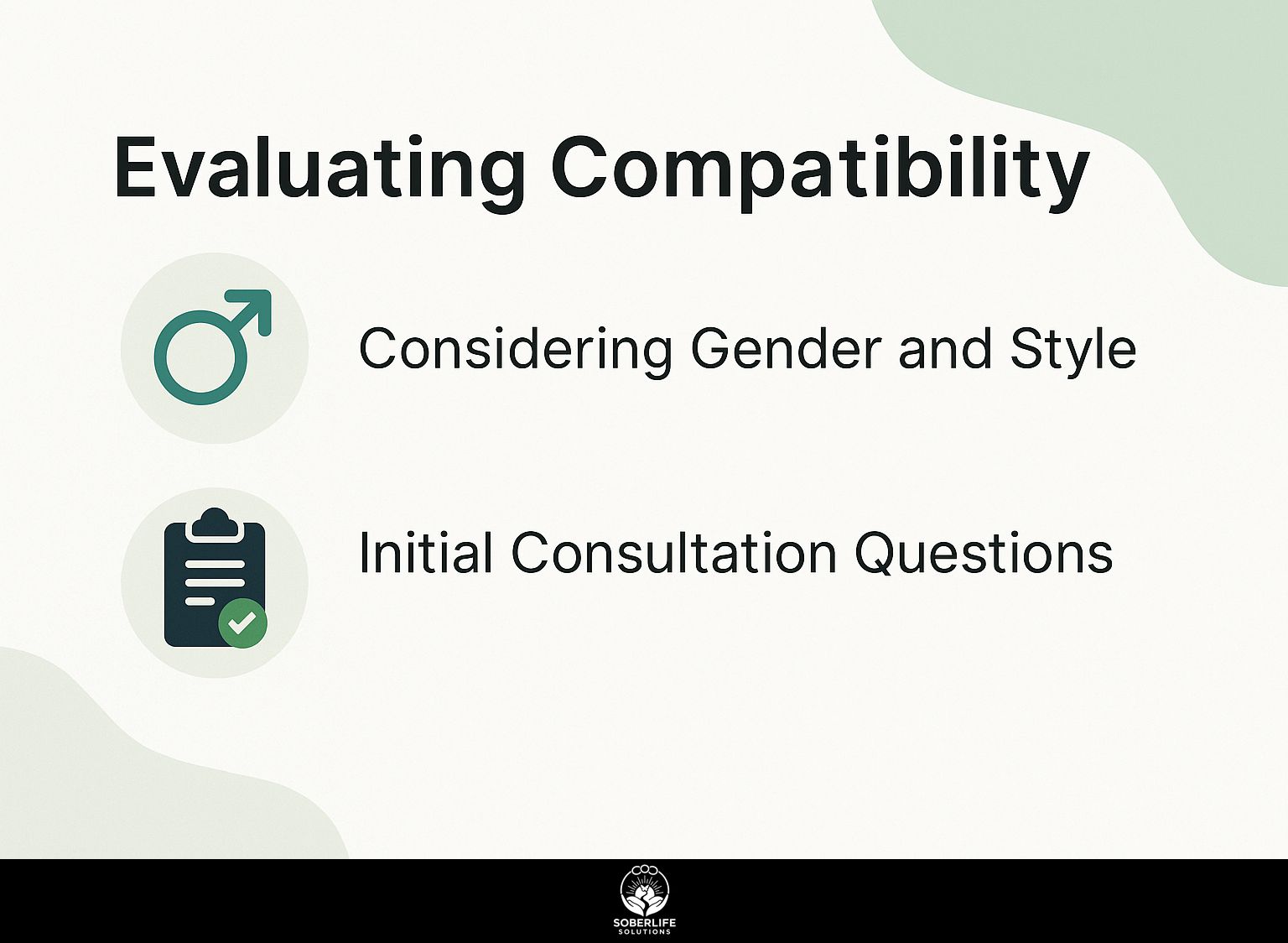
Checking if you and your therapist are a good match is important for creating a helpful and supportive therapy relationship. Consider how this match can also influence your broader personal goals, such as improving quality of life during challenging times. Related insight: How to Improve Quality of Life During Alcoholism Recovery
Considering Gender and Style
Many individuals feel more comfortable with therapists of a specific gender or communication style, which can significantly influence therapy effectiveness.
For instance, some clients might like a clear method, valuing therapists who give honest feedback and simple plans.
Some people may prefer a kind approach, where therapists focus on emotional connection and empathy.
Preferences can also extend to gender; some individuals may find it easier to discuss certain issues with a therapist of the same gender, citing comfort and shared experiences.
Therapists need to know these factors to build a welcoming setting that encourages trust and open communication.
Initial Consultation Questions
Preparing thoughtful questions for your initial consultation can clarify a therapist’s approach and compatibility with your needs.
Consider asking about their therapeutic methods, such as cognitive-behavioral therapy or mindfulness techniques, and how these align with your goals.
Ask about their experience with specific issues-do they have experience with anxiety, depression, or trauma?
It’s beneficial to understand their preferred session formats. Will you have the option for in-person meetings, video calls, or phone sessions?
By discussing these topics, you’ll improve your ability to make a well-informed choice that matches your path to recovery.
Making the Final Decision
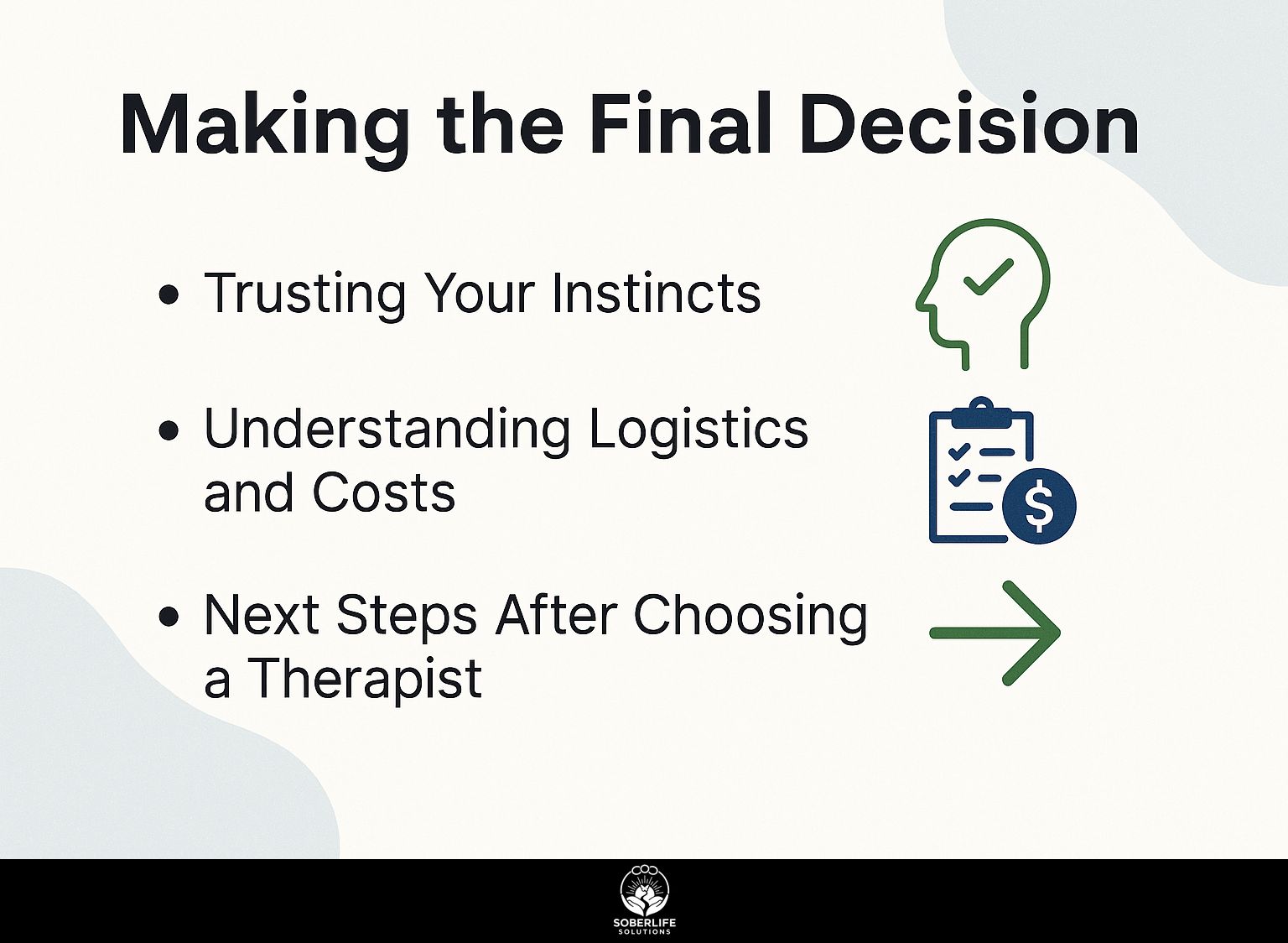
Choosing a therapist should include trusting your feelings and thinking about practical things like location and fees.
Trusting Your Instincts
How you first feel about a therapist can strongly predict how well your therapy will go.
Relying on your gut feelings is important, but combining them with clear standards can improve how you make choices. Consider scheduling an initial consultation to gauge their communication style, approach, and environment.
Pay attention to how comfortable you feel discussing personal topics. Research their qualifications-look for licensed professionals with experience in your specific concerns, like CBT for anxiety or trauma-informed care.
Combining both gut feelings and professional credentials can lead to more informed, satisfying therapeutic relationships.
Understanding Logistics and Costs
Knowing about therapy costs and insurance options is important for keeping your therapy sessions manageable.
Begin by researching your insurance plan; most providers offer online tools to check coverage for mental health services.
Make a list of potential therapists, noting their session fees-typically ranging from $75 to $200 per session.
When contacting them, inquire about their acceptance of your insurance and whether they offer sliding scale fees. For example, a therapy session that usually costs $150 may be reduced to $100 if financial help is available.
Using these strategies helps you find treatment that fits your needs and budget.
Next Steps After Choosing a Therapist
Once you choose a therapist, make sure to communicate openly and agree on goals for your sessions.
Begin by discussing your expectations regarding the therapy process, including what you hope to achieve and any specific issues you want to address.
Regularly assess your progress by asking for feedback and sharing your feelings about the sessions. This might involve meeting weekly or bi-weekly to confirm you and your therapist are aligned on your goals.
Consider maintaining a journal to track your emotions and experiences, helping both you and your therapist pinpoint patterns and areas of focus. This creates a transparent, collaborative environment conducive to growth.
Frequently Asked Questions
How do I know if a therapist is qualified?
One way to determine if a therapist is qualified is to check if they are licensed. This means they have met the education and training requirements set by their state and have passed a licensing exam. You can also research their credentials and experience in treating specific issues.
What qualifications should I look for in a therapist?
Besides checking their license, consider their experience, particular skills, and how they handle therapy. It’s important to find a therapist who has experience in treating issues similar to yours and uses a therapeutic approach that aligns with your needs.
How can I find a qualified therapist?
You can start by asking for recommendations from trusted friends, family, or healthcare professionals. Online directories and therapist search engines can also help you find qualified therapists in your area. Take time to carefully look into and evaluate possible therapists before choosing one.
Is a therapist’s gender important?
It really comes down to what you like and feel comfortable with. Some people may feel more comfortable discussing certain issues with a therapist of the same gender, while others may not have a preference. It’s important to find a therapist who you feel safe and at ease with.
What should I consider when choosing a therapist?
Aside from qualifications, it’s important to consider factors such as location, availability, and cost. You should also think about your specific needs and what type of therapy or therapeutic approach would be most beneficial for you.
What if I don’t feel comfortable with my chosen therapist?
It’s normal to not feel an immediate connection with a therapist, but it’s important to give the therapeutic relationship a chance. But if you still feel uneasy after a few sessions, it’s alright to find a different therapist. Your well-being and comfort should always be a top priority.

